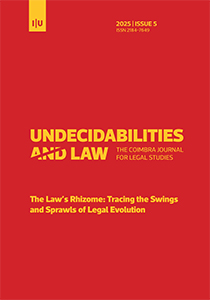CALL FOR PAPERS / SUBMISSIONS VOLUME VII (2027)
THE ROLE OF LAW IN COMPUTATIONAL SOCIETIES
ISSUE EDITORS: Christoph Burchard (Goethe-Universität Frankfurt am Main, Center for Critical Computational Studies) & Susana Aires de Sousa (Faculty of Law, UCILeR, Univ Coimbra)
Computation has become a central condition of contemporary governance. Algorithmic systems, platform infrastructures, and data-driven decision-making now structure key domains of public and private life—from criminal justice and education to migration, finance, and environmental regulation. As legal norms are increasingly shaped by, implemented through, or bypassed by computational systems, the role of law may be undergoing fundamental transformation.
This special issue explores how law functions within, through, and against computational regimes. Law operates within such regimes when it adapts to their operational dynamics; through them when it becomes encoded into platform governance or automated procedures; and against them when it seeks to resist the epistemic, normative, or distributive implications of computation. At stake is not only the question of whether law can regulate these systems, but also whether it retains its function as a public, accountable, and contestable site of ordering in an age increasingly governed by computational technologies and their embedded normative orders.
Read more about CALL FOR PAPERS / SUBMISSIONS VOLUME VII (2027)


